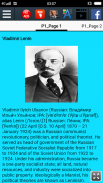








Biography of Vladimir Lenin

Biography of Vladimir Lenin का विवरण
Vladimir Ilyich Ulyanov (22 April [O.S. 10 April] 1870 – 21 January 1924) was a Russian communist revolutionary, politician, and political theorist. He served as head of government of the Russian Soviet Federative Socialist Republic from 1917 to 1924 and of the Soviet Union from 1922 to 1924. Under his administration, Russia became a one-party socialist state; all land, natural resources, and industry were socialized into public property. Ideologically a Marxist, his political theories are known as Leninism.
Born to a wealthy middle-class family in Simbirsk, Lenin gained an interest in revolutionary socialist politics following his brother's execution in 1887. Expelled from Kazan State University for participating in protests against the Russian Empire's Tsarist regime, he devoted the following years to a law degree. In 1893 he moved to Saint Petersburg and became a senior figure in the Marxist Russian Social Democratic Labour Party (RSDLP). Arrested for sedition and exiled to Shushenskoye for three years, there he married Nadezhda Krupskaya. After his exile he moved to Western Europe, where he became a prominent party theorist through his publications. In 1903, he took a key role in a RSDLP schism over ideological differences, leading the Bolshevik faction against Julius Martov's Mensheviks. Encouraging insurrection during Russia's failed Revolution of 1905, he later campaigned for the First World War to be transformed into a Europe-wide proletarian revolution, which as a Marxist he believed would result in the overthrow of capitalism and its replacement with socialism. After the 1917 February Revolution ousted the Tsar and established a Provisional Government, he returned to Russia to campaign for the new regime's removal by a Bolshevik-led government of the soviets.
व्लादिमीर इलिच उल्यानोव (1870 22 अप्रैल [ओएस 10 अप्रैल] - 21 जनवरी 1924) एक रूसी कम्युनिस्ट क्रांतिकारी, राजनीतिज्ञ, और राजनीतिक विचारक था। उन्होंने कहा कि रूस एक पार्टी समाजवादी राज्य बन गया है, उनके प्रशासन के तहत 1924 के लिए 1917-1924 और 1922 से सोवियत संघ के रूसी सोवियत संघात्मक समाजवादी गणराज्य की सरकार के मुखिया के रूप में काम किया; सारे देश, प्राकृतिक संसाधन, और उद्योग के सार्वजनिक संपत्ति में socialized थे। वैचारिक रूप से मार्क्सवादी, अपने राजनीतिक सिद्धांतों लेनिनवाद के रूप में जाना जाता है।
Simbirsk में एक धनी मध्यवर्गीय परिवार में जन्मे, लेनिन रूसी साम्राज्य के Tsarist शासन के खिलाफ विरोध प्रदर्शन में भाग लेने के लिए कज़ान राज्य विश्वविद्यालय से निष्कासित 1887 में अपने भाई के निष्पादन के बाद क्रांतिकारी समाजवादी राजनीति में रुचि का फायदा हुआ है, वह एक कानून के लिए निम्न वर्षों के लिए समर्पित डिग्री। उन्होंने 1893 में सेंट पीटर्सबर्ग में ले जाया गया और मार्क्सवादी रूसी सोशल डेमोक्रेटिक लेबर पार्टी (RSDLP) में एक वरिष्ठ व्यक्ति बन गए। राजद्रोह के आरोप में गिरफ्तार और तीन साल के लिए Shushenskoye को निर्वासित किया, वह वहां Nadezhda Krupskaya शादी कर ली। अपने निर्वासन के बाद उन्होंने कहा कि वह अपने प्रकाशनों के माध्यम से एक प्रमुख पार्टी के विचारक बन गया है जहां पश्चिमी यूरोप, के लिए ले जाया गया। 1903 में, वह जूलियस Martov के Mensheviks के खिलाफ बोल्शेविक गुट के प्रमुख, वैचारिक मतभेदों पर एक RSDLP फूट करने में एक महत्वपूर्ण भूमिका अदा की। प्रथम विश्व युद्ध के एक मार्क्सवादी के रूप में वह पूंजीवाद को उखाड़ फेंकने और समाजवाद के साथ अपने प्रतिस्थापन पर नतीजा होगा माना जाता है, जो एक यूरोप में व्यापक सर्वहारा क्रांति में तब्दील होने के लिए 1905 के रूस के असफल क्रांति के दौरान विद्रोह को प्रोत्साहित करना, वह बाद में अभियान चलाया। 1917 फरवरी क्रांति ज़ार अपदस्थ और एक अस्थायी सरकार स्थापित करने के बाद, वह सोवियत संघ के एक बोल्शेविक के नेतृत्व वाली सरकार द्वारा नई सरकार को हटाने के लिए चुनाव प्रचार करने के लिए रूस में लौट आए।
























